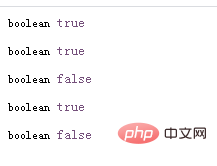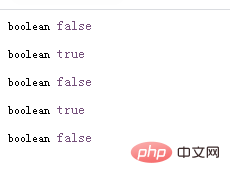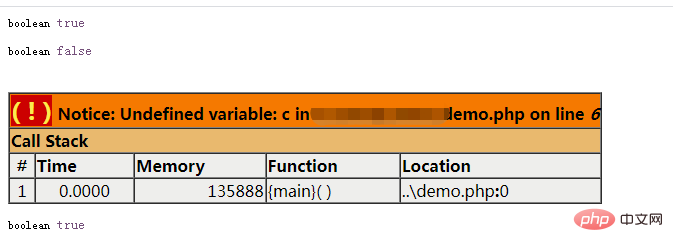How to check null values using PHP (4 methods)
In the previous article "PHP Array Learning: How to Remove Blank or Duplicate Elements", we learned that we can use the empty() function to determine whether a value is empty. So what are the ways to check null values in PHP? This time we will learn about several common methods. If you need it, you can learn about it~
The theme of today’s article is: using PHP to detect whether a value is empty or not. Okay, let’s get straight to the point. Here are some common methods.
Method 1: Use empty()
empty function: detect whether the variable is "empty"
Any uninitialized variable, the value is 0 or false or empty string "" or null variables, empty arrays, objects without any attributes will be judged as TRUE.
Let’s take a closer look at the code example:
<?php
$a = 'test';
$b = array('key1' => 'value1');
$class = new stdClass();
var_dump(empty($c)); // 输出 bool(true)
var_dump(empty($b['key2'])); // 输出 bool(true)
var_dump(empty($class)); // 输出 bool(false)
var_dump(empty($class->test->test)); // 输出 bool(true)
class EmptyClass{};
$empty_class = new EmptyClass();
var_dump(empty($empty_class));// 输出 bool(false)
?>Output result:

The following variables will be considered empty Is empty:
"" (empty string)
0 (0 as an integer)
0.0 (0 as a floating point number)
"0" (0 as a string)
NULL
FALSE
array() (an empty array)
$var; (one declared, But variables with no value)
Learn about
0,'0','',null、falseThe difference between these five types.
null means non-existence: the value is not stored in the zval space at the bottom of PHP, only a type mark IS_NULL is stored.
And 0, '0', '', false these four exist, the bottom layer of php is to open up zval space storage, with value and type.
string '0' is not equal to string ''
int 0 is equal to string '' null, (non-identical comparison, PHP will do type conversion)
string '0' is not equal to null, int 0 is equal to null
Method 2: Use isset()
isset function: determine whether the variable has been initialized and can be used to test whether the variable has been configured. Returns true if the variable already exists; returns false otherwise.
Let’s take a look at the code example below:
<?php $a = 'test'; $b = array('key1' => 'value1'); $class = new stdClass(); var_dump(isset($class->test->test)); // 判断对象属性是否定义:输出 bool(false) var_dump(isset($a)); // 判断变量是否定义:输出 bool(true) var_dump(isset($c)); // 判断变量是否定义:输出 bool(false) var_dump(isset($b['key1'])); // 判断数组元素是否定义:输出 bool(true) var_dump(isset($b['key2'])); // 判断数组元素是否定义:输出 bool(false) ?>
Output result:

Method 3: Use is_null()
is_null function: detect whether the variable is "null".
When a variable is assigned a value of "null", the detection result is true; 0, empty string, false, and empty array are all detected as false.
Let’s take a closer look at the code example:
<?php $a = null; $b = false; var_dump(is_null($a)); var_dump(is_null($b)); var_dump(is_null($c)); ?>
Output result:

Method 4: Use == or === operator
can use
var == nullto determine whether the variable is "null". When a variable is assigned a value of "null", the detection result is true; while 0, empty string, false, and empty array are all detected as false. If the variable is not initialized, the program will report an error.
The essence is that the == expression will perform automatic type conversion on the variables on both sides, so the judgment result is true.
Let’s take a look at the code example below:
<?php $a = 0; $b = array(); var_dump($a == null); var_dump($b == null); var_dump($c == null); ?>
- ##You can use
var === null
To detect whether the variable is "null", the type of the variable must also be "null". When judging "null", equal to is_null has the same effect.
<?php $a = 0; $b = false; $c = 0.0; $d = null; $e = ''; var_dump(0 === $a); // 输出 bool(true) var_dump(0 === $b); // 输出 bool(false) var_dump(0 === $c); // 输出 bool(false) var_dump(0 === $d); // 输出 bool(false) var_dump(0 === $e); // 输出 bool(false) var_dump('' === $e); // 输出 bool(true) var_dump('' === $a); // 输出 bool(false) var_dump('' === $b); // 输出 bool(false) var_dump(0.0 === $c);// 输出 bool(true) var_dump(0.0 === $a); // 输出 bool(false) ?>
The above is the detailed content of How to check null values using PHP (4 methods). For more information, please follow other related articles on the PHP Chinese website!

Hot AI Tools

Undresser.AI Undress
AI-powered app for creating realistic nude photos

AI Clothes Remover
Online AI tool for removing clothes from photos.

Undress AI Tool
Undress images for free

Clothoff.io
AI clothes remover

Video Face Swap
Swap faces in any video effortlessly with our completely free AI face swap tool!

Hot Article

Hot Tools

Notepad++7.3.1
Easy-to-use and free code editor

SublimeText3 Chinese version
Chinese version, very easy to use

Zend Studio 13.0.1
Powerful PHP integrated development environment

Dreamweaver CS6
Visual web development tools

SublimeText3 Mac version
God-level code editing software (SublimeText3)

Hot Topics
 PHP 8.4 Installation and Upgrade guide for Ubuntu and Debian
Dec 24, 2024 pm 04:42 PM
PHP 8.4 Installation and Upgrade guide for Ubuntu and Debian
Dec 24, 2024 pm 04:42 PM
PHP 8.4 brings several new features, security improvements, and performance improvements with healthy amounts of feature deprecations and removals. This guide explains how to install PHP 8.4 or upgrade to PHP 8.4 on Ubuntu, Debian, or their derivati
 7 PHP Functions I Regret I Didn't Know Before
Nov 13, 2024 am 09:42 AM
7 PHP Functions I Regret I Didn't Know Before
Nov 13, 2024 am 09:42 AM
If you are an experienced PHP developer, you might have the feeling that you’ve been there and done that already.You have developed a significant number of applications, debugged millions of lines of code, and tweaked a bunch of scripts to achieve op
 How To Set Up Visual Studio Code (VS Code) for PHP Development
Dec 20, 2024 am 11:31 AM
How To Set Up Visual Studio Code (VS Code) for PHP Development
Dec 20, 2024 am 11:31 AM
Visual Studio Code, also known as VS Code, is a free source code editor — or integrated development environment (IDE) — available for all major operating systems. With a large collection of extensions for many programming languages, VS Code can be c
 Explain JSON Web Tokens (JWT) and their use case in PHP APIs.
Apr 05, 2025 am 12:04 AM
Explain JSON Web Tokens (JWT) and their use case in PHP APIs.
Apr 05, 2025 am 12:04 AM
JWT is an open standard based on JSON, used to securely transmit information between parties, mainly for identity authentication and information exchange. 1. JWT consists of three parts: Header, Payload and Signature. 2. The working principle of JWT includes three steps: generating JWT, verifying JWT and parsing Payload. 3. When using JWT for authentication in PHP, JWT can be generated and verified, and user role and permission information can be included in advanced usage. 4. Common errors include signature verification failure, token expiration, and payload oversized. Debugging skills include using debugging tools and logging. 5. Performance optimization and best practices include using appropriate signature algorithms, setting validity periods reasonably,
 PHP Program to Count Vowels in a String
Feb 07, 2025 pm 12:12 PM
PHP Program to Count Vowels in a String
Feb 07, 2025 pm 12:12 PM
A string is a sequence of characters, including letters, numbers, and symbols. This tutorial will learn how to calculate the number of vowels in a given string in PHP using different methods. The vowels in English are a, e, i, o, u, and they can be uppercase or lowercase. What is a vowel? Vowels are alphabetic characters that represent a specific pronunciation. There are five vowels in English, including uppercase and lowercase: a, e, i, o, u Example 1 Input: String = "Tutorialspoint" Output: 6 explain The vowels in the string "Tutorialspoint" are u, o, i, a, o, i. There are 6 yuan in total
 How do you parse and process HTML/XML in PHP?
Feb 07, 2025 am 11:57 AM
How do you parse and process HTML/XML in PHP?
Feb 07, 2025 am 11:57 AM
This tutorial demonstrates how to efficiently process XML documents using PHP. XML (eXtensible Markup Language) is a versatile text-based markup language designed for both human readability and machine parsing. It's commonly used for data storage an
 Explain late static binding in PHP (static::).
Apr 03, 2025 am 12:04 AM
Explain late static binding in PHP (static::).
Apr 03, 2025 am 12:04 AM
Static binding (static::) implements late static binding (LSB) in PHP, allowing calling classes to be referenced in static contexts rather than defining classes. 1) The parsing process is performed at runtime, 2) Look up the call class in the inheritance relationship, 3) It may bring performance overhead.
 What are PHP magic methods (__construct, __destruct, __call, __get, __set, etc.) and provide use cases?
Apr 03, 2025 am 12:03 AM
What are PHP magic methods (__construct, __destruct, __call, __get, __set, etc.) and provide use cases?
Apr 03, 2025 am 12:03 AM
What are the magic methods of PHP? PHP's magic methods include: 1.\_\_construct, used to initialize objects; 2.\_\_destruct, used to clean up resources; 3.\_\_call, handle non-existent method calls; 4.\_\_get, implement dynamic attribute access; 5.\_\_set, implement dynamic attribute settings. These methods are automatically called in certain situations, improving code flexibility and efficiency.




)
)


